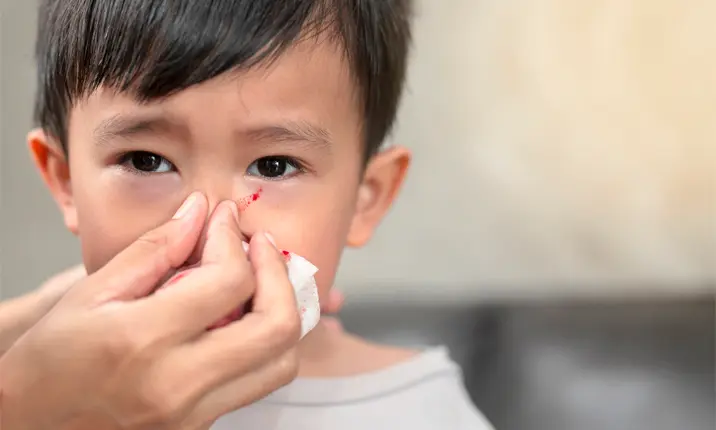When to worry about a nosebleed-various-aspects-
Most nosebleeds stop bleeding on their own. However, if they are prolonged or particularly severe, they may indicate a different medical issue, like internal bleeding, and need urgent medical attention.
A nosebleed can be frightening, particularly if it occurs to your youngster. However, even if nosebleeds can occur unexpectedly, most of them may be treated at home and are not a cause for alarm.
Your nose’s surface lining is rich in blood vessels, so even the smallest wound or irritation can cause bleeding.
Although nosebleeds are common in both children and adults, some are more serious and necessitate calling a doctor.
Here are some typical reasons of nosebleeds, various methods to treat them at home, and tips on when to consult a physician.


How can you tell whether a nosebleed is severe?
When your nose starts bleeding, it’s natural to be concerned. It seems, at best, strange and, at worst, like a horror movie when blood exits your nose.
However, be assured that the majority of nosebleeds appear worse than they are.
Dr. Sagar Rajkuwar, uses the scenario of adding a single drop of blood to a toilet bowl, noting that the entire bowl turns red. “It doesn’t take a lot of blood to look like something extreme. We usually vastly overestimate the volume of blood that’s present.”
Thus, it’s unlikely that you’re in danger of “bleeding out” (and if you were, it would be obvious that you would require medical treatment). However, a normal nosebleed can still be a sign that something is amiss.
Maybe your nose is just bothered by things like allergies, dry air, or your nasal spray. However, it might be more than that.
When a nosebleed warrants medical treatment, Dr.Sagar Rajkuwar, names three situations:
- It lasts for a long time.
- You often get nosebleeds.
- You are prone to bleeding.
Let’s examine the causes of dangerous nosebleeds more closely.
An intractable nosebleed
One of the most important factors in deciding whether a nosebleed is cause for concern is its duration. It is possible that a nosebleed that lasts for more than 20 minutes is reason for worry.
However, what you do during those 20 minutes to stop the bleeding is important.
The following is how to determine if your nosebleed is lasting too long.
The first thing you should do when your nose begins to bleed is promote clot formation. You accomplish this by applying pressure to your nose.
Dr. Sagar Rajkuwar, “You want to compress the site of bleeding.” “If you’re holding enough pressure in the right spot, it won’t be able to bleed anymore.”
To help the bleeding cease, Dr. Sagar Rajkuwar, advises taking these actions.
- Keep your cool and take deep breaths via your mouth.
- Take a seat and lean your head and body somewhat forward. (Note: That’s slightly forward; don’t lower your head into your lap or gaze at your shoes.)
- To collect any blood that may be dripping, put a basin or wet washcloth on your lap.
- The fleshy area of your nose should be pinched between your thumb and index finger. (Not the bony part.)
- For at least 10 minutes, keep your nose pinched (use a timer or watch the clock).
- Repeat for additional 10 minutes if it hasn’t ceased.
- It’s time to get emergency medical treatment if there is still bleeding.
Time might seem a bit different if you’re concerned about the blood pouring out of your nose, so use a timer. In reality, what may seem like an eternity could only be a matter of minutes.
It’s crucial to resist the urge to relieve pressure before those 10 minutes have passed. Since you have to restart the clock every time you look to see if it has stopped.
“Holding your nose for ten minutes will feel strange and unpleasant. “It’s not a simple job,” admits Dr. Sagar Rajkuwar, “but it takes eight to ten minutes for fibrin proteins in your blood to begin to form a clot to stop the bleeding. If you let go, the developing clot just washes out, and your body has to start all over again.”
You should seek immediate care in an emergency room or urgent care center if the bleeding persists after two 10-minute nose-holds.
Once there, your nosebleed may be treated by healthcare professionals by packing it with gauze or specialized nasal sponges. (Keep in mind that, while some individuals may tell you to use tissues or tampons to absorb the blood, Dr. Sagar Rajkuwar, advises against this practice.) Leave that to the experts; you’re more prone to aggravate the lining of your nose and induce more bleeding.
In some instances, providers can advise cauterization to stop the hemorrhage blood vessel.
Repeated nosebleeds
Do you ever question how many nosebleeds is too many? It’s really a matter of opinion, and it might differ from individual to individual. However, if you are experiencing frequent nosebleeds that are interfering with your daily life, you should see an otolaryngologist, a specialist in disorders of the ears, nose, and throat.
“For instance, a kid who has nosebleeds twice a week and has to spend half an hour away from their classroom dealing with them is missing out on valuable class time. According to Dr. Sagar Rajkuwar, “That’s a reasonable cause to get checked out,” or “If you’re waking up in the middle of the night with bloody sheets for some time, that’s going to be enough for some people to say that’s past the threshold of what’s acceptable for them.”
When should nosebleeds be a cause for concern?
The majority of kids and adults will experience at least one nosebleed during their lifetime. Typically, after a few minutes of self-care, the bleeding will stop. However, in some cases, nosebleeds have symptoms that may justify calling or visiting a physician.
When to Call a Doctor for Kids
It’s natural to feel anxious if your child gets a nosebleed. However, remember that kids frequently get nosebleeds. Naturally, this doesn’t imply that you should disregard all nosebleeds.
Sometimes a nosebleed is so minor that you can just see blood dripping or running from your child’s nose. They may bleed from either one or both of their nostrils. Immediate home care can help control bleeding.
However, you should see a doctor in the following situations:
- If your child has a head or face injury, the nosebleed should be treated with direct pressure for 20 minutes before seeking medical attention. The nose or skull can be seriously injured.
- Your kid has something lodged in their nose.
- Your kid exhibits additional signs, such as trouble breathing, exhaustion, headaches, dizziness, or vomiting. This might suggest excessive blood loss or blood running down their throat.
When adults should see a doctor
You shouldn’t disregard some symptoms even if you are accustomed to getting nosebleeds as an adult.
Call your doctor in the same manner as you would a child if a nosebleed does not stop after 20 minutes of applying direct pressure or if you lose a significant amount of blood (more than a cup).
You should also contact your doctor if blood dripping down your throat causes you to have trouble breathing, gagging, or vomiting.
A severe injury to your head or face that results in a nosebleed also requires medical care.
If you bleed from other areas of your body, such as your ears or rectum, this may be a sign of internal bleeding, blood clotting disorders, or blood vessel disorders.
Additionally, a doctor should evaluate both adults and children for recurring and frequent nosebleeds, even if they are slight. This might suggest a persistent issue in the nose, such as nasal polyps or growths.
What are the most common causes of nosebleeds?
If you or your child get a nosebleed, don’t freak out. Minor bleeds can be caused by a variety of factors. For instance:
- nose picking
- slight nose injury
- allergies, sinusitis, and the common cold
- dry atmosphere
- blowing your nose excessively forcefully
- excessive use of nasal decongestant sprays
- elevated altitudes
- chemical irritants
- blood-thinning drugs
- deviated septum
- stress
- pregnancy
If any patient of ENT requires any surgery, opd consultation or online consultation in clinic of ENT specialist Doctor Dr Sagar Rajkuwar ,he may contact him at the following address-
Prabha ENT clinic, plot no 345,Saigram colony, opposite Indoline furniture Ambad link road, Ambad ,1 km from Pathardi phata Nashik ,422010, Maharashtra, India-Dr Sagar Rajkuwar (MS-ENT), Cell no- 7387590194 , 9892596635
Issued in public interest by –
Possible reasons for recurring nosebleeds
A child’s repeated nosebleeds may be caused by something like nose-picking (which is both disgusting and true). Their nose is more prone to feel dry in cold temperatures, which is when it’s especially prevalent.
Dry air irritating the nose may be the only cause of frequent nosebleeds in children and adults. A saline spray or a moisturizing nasal cream may be beneficial in these circumstances to help moisturize your nasal passages.
See a healthcare professional if those actions don’t work. They might look for things like a deviated septum or less common causes for frequent nosebleeds, such as nasal tumors, bleeding disorders, or hereditary hemorrhagic telangiectasia, a genetic condition that impairs the development of blood vessels. Rarely, juvenile nasopharyngeal angiofibroma, a benign tumor, may be linked to recurrent nosebleeds in teenage boys.
Nosebleeds if you have a bleeding condition
Your threshold for seeking treatment should be lower than that of the majority of people if you have particular illnesses. This covers those who have been identified as having a bleeding disorder, such as hemophilia or Von Willebrand disease, sometimes referred to as a bleeding diathesis. or if you are on blood-thinning medicine and have a nosebleed.
“It’s harder to stop bleeding once it starts if you have a bleeding condition or if you regularly use blood thinners or aspirin,” Dr. Sagar Rajkuwar, says. “Working with an otolaryngologist can help you figure out appropriate mitigation strategies for you, like steps to keep your nose very moisturized to try to prevent them and then having a plan and action plan for when nosebleeds happen.”
The majority of nosebleeds cease by themselves with a few minutes of pinching (without peeking). However, if the bleeding persists or if nosebleeds are interfering with your life, a visit to a provider can make a big difference.
How should regular nosebleeds be treated?
Here are some self-care suggestions for adults and youngsters to use when dealing with the occasional nosebleed.
Stay upright. Maintaining an upright posture helps blood drain from your nose and stops it from going down your throat. Vomiting and nausea might result from blood dripping down your throat.
Apply cold therapy. Placing a cold compress on the bridge of your nose can help stop bleeding by constricting the blood vessels in your nose.
Once, gently blow your nose. This can assist in clearing any blood clots from your nose.
For five minutes, pinch your nose. Without letting go, softly press the fleshy part of your nose for at least five minutes. Applying pressure to your nasal septum might halt blood flow. You can repeat this for up to 15 minutes as needed.
Utilize a wet washcloth. Do not insert tissue or gauze into your own or your child’s nostrils. Instead, place a damp washcloth over the nose to help soak up the blood.
Your doctor may suggest alternative therapies if you experience nosebleeds that are more severe or occur more often. This comprises:
- surgically rectifying a deviated septum
- modifying your blood thinner medication
- utilizing a cauterization method to seal a bleeding blood vessel
How can nosebleeds be prevented most effectively?
Here are some suggestions to help reduce the frequency of nosebleeds if you or your child experience them, possibly as a result of known conditions like allergies, sinusitis, or others.
- To maintain moisture in your nasal passages, use saline nose drops as instructed.
- When a nosebleed is brought on by allergies or the common cold, utilize a humidifier.
- Avoid blowing your nose too forcefully.
- Try to quit smoking, as it might irritate and dry out your nasal passages.
- Cut your child’s nails and prevent them from picking their noses.
- Use protective facial equipment when participating in some sports.
- To avoid harming the blood vessels inside your nose, sneeze with your mouth open.
Takeaway
Although a nosebleed might appear much worse than it actually is, some bleeds are cause for alarm.
Take immediate action to self-treat at home if it happens to you or your child. The majority of nosebleeds stop within minutes. However, if the bleeding doesn’t stop or you have other symptoms, call a doctor or go to see one.
Issued in public interest by –
-FOR FURTHER INFORMATION IN GREAT DETAIL What Are Nosebleeds A Symptom PL CLICK ON THE LINK GIVEN BELOW-It is always better to view links from laptop/desktop rather than mobile phone as they may not be seen from mobile phone. ,in case of technical difficulties you need to copy paste this link in google search. In case if you are viewing this blog from mobile phone you need to click on the three dots on the right upper corner of your mobile screen and ENABLE DESKTOP VERSION-







